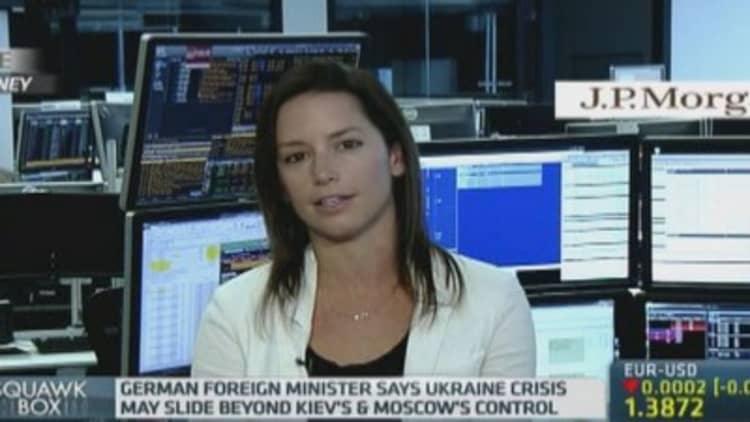
Tensions over Ukraine have been simmering for weeks and now threaten to spill over into a much deeper risk-off mood in global financial markets, some analysts say.
"I do think there is more room for a risk-off move given this Ukraine issue, which has been bubbling away in the background but is increasing in intensity," Laura Fitzsimmons, the vice president for futures and options at JPMorgan Investment Bank in Sydney, told CNBC. "That could crystalize in the next few weeks to become an issue for markets."
Read MoreUkraine versus economic news: What matters more to market
The flashpoints of eastern and southern Ukraine were quieter Tuesday following the escalating tensions of Monday and the weekend when pro-Russian rebels shot down a Ukrainian helicopter in fierce fighting on the eastern town of Slaviansk and Ukraine drafted special police forces to the southwestern port city of Odessa to stop rebellion spreading west, Reuters reported.
Ukraine has been in the market spotlight since February when the pro-Russian former President Viktor Yanukovich was ousted from power following street protests that turned violent. A pro-Western interim government took charge and not long after Russia used its military to back separatists in Ukraine's Crimea region, triggering sanctions from the U.S. and Europe.
Read MoreEU hardens stance on Gazprom pipeline
Separately, the Russian Ministry of Finance said it is expecting Russia's gross domestic product to drop in the second quarter, according to news agency RIA. This would mark a second quarter of contraction for Russia.
Quoting ministry director Maxim Oreshkin, RIA reported Tuesday that economic performance in the third quarter will be largely affected by geopolitical risks and bank credit. Oreshkin added that April saw weaker gas production, freight transport and business activity signs.
Fighting in parts of Ukraine has intensified, fueling fears that the crisis may not be contained as previously hoped.
"I am acutely aware that Ukraine is inching closer and closer to civil war; if it erupts the Eurasia fallout will be felt across the world; commodities will be volatile, currencies will see gyrations and equity markets will experience downward pressure," Evan Lucas, market strategist at trading firm IG, said in a note.
"Let's hope this scenario does not arise but it will be a flash point for a possible sell-off - which the market seems to be gunning for," he added.
Concerns over Ukraine weighed on Wall Street shares on Monday, although upbeat news on U.S. service-sector activity helped shares bounce back.
Global stock markets in general have proved resilient to geopolitical tensions this year, with the S&P 500 up almost 1.8 percent. European stock markets have gained about 2.6 percent, while Asia-Pacific shares outside Japan are about 1.6 percent higher.
Fitzsimmons at JPMorgan said she expected any pull-back in global stocks related to the Ukraine crisis to be in the region of 5-10 percent, with Europe likely to be hit harder than the U.S.
Read MoreThe bond market is giving the stock market angst
Analysts said safe-havens such as the Japanese yen and U.S. Treasurys could also gain further ground.
The yen was trading at about 102.2 per dollar on Tuesday, about three percent above a five-year low hit in early January.
"The current tight swivels indicate uncertainties over the Russian-Ukraine conflict," analysts at Maybank said in a note. "Any mobilization of armies by Moscow could drag the pair towards the 101.66-support."
Greg Matwejev, director for currency hedge-fund sales and trading at Newedge, added: "With the tensions in Ukraine, there is another incentive to get back into safe-havens. There has consistently been a reason to buy Treasurys."
The yield on the benchmark 10-year Treasury on Monday briefly fell to about 2.57 percent, its lowest level in three months.


